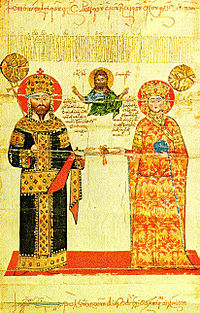Golden bull



Agolden bullorchrysobullwas adecreeissued byByzantine emperorsand monarchs in Europe during theMiddle AgesandRenaissance.
Description
[edit]A golden bull was adecreeissued byByzantine Emperors.It was later used by monarchs in Europe during theMiddle AgesandRenaissance,most notably by theHoly Roman Emperors.
For nearly eight hundred years, they were issued unilaterally, without obligations on the part of the other party or parties. However, this eventually proved disadvantageous as the Byzantines sought to restrain the efforts of foreign powers to undermine the empire. During the 12th century, the Byzantines began to insert into golden bulls sworn statements of the obligations of their negotiating partners.[citation needed]
Etymology
[edit]The term was originally coined for the goldenseal(abullaaurea), attached to the decree, but came to be applied to the entire decree. Such decrees were known as golden bulls in western Europe andchrysobullos logos,or chrysobulls, in the Byzantine Empire (χρυσός,chrysos,beingGreekforgold).[1]
Notable golden bulls
[edit]Notable golden bulls include:
- The Golden Bull of 1082,issued byAlexios I Komnenosto grantVenicemerchants with free trading rights, exempt from tax, throughout theByzantine Empirein return for their defense of theAdriatic Seaagainst theNormans.[2]
- The Golden Bull of 1136, issued byPope Innocent II,more commonly known as theBull of Gniezno
- TheGolden Bull of Sicily,issued in 1212 byFrederick II, Holy Roman Emperor
- TheGolden Bull of 1213,issued byFrederick II, Holy Roman Emperor
- TheGolden Bull of 1213,issued by the papacy to recognize its agreement withJohn Lackland(more commonly known asKing John of England)
- TheGolden Bull of 1214,issued byFrederick II, Holy Roman Emperorto cede all German territories north of the riversElbeandEldeto KingValdemar the VictoriousofDenmark
- TheGolden Bull of Berne,supposedly issued by Frederick II in 1218, but now considered a forgery
- TheGolden Bull of 1222,issued by KingAndrew II of Hungaryto confirm the rights of nobility and forced on him in much the same wayKing John of Englandwas made to signMagna Carta
- TheGolden Bull of 1224(theGoldener Freibrief) issued by Andrew to grant certain rights to theSaxon inhabitants of Transylvania
- TheGolden Bull of Rimini(1226), issued byFrederick II, Holy Roman Emperor
- TheGolden Bull of 1242issued by KingBéla IVto proclaim afree royal cityfor the inhabitants ofGradec(part ofZagreb) andSamoborinCroatia,during theMongol invasion of Europe.[3][4]
- TheGolden Bull of 1267,issued by King Béla IV of Hungary
- TheGolden Bull of 1348,issued byKingCharles IofBohemia,laterHoly Roman Emperoras Charles IV, to confer privileges and immunities onCharles Universityestablished byPope Clement VIinPrague,one of the oldest universities in the world
- TheGolden Bull of 1356(one of the most famous golden bulls), issued byHoly Roman Emperor Charles IVfor promulgation at theDiet of Nuremberg,to define (and to last more than four hundred years) the constitutional structure of theHoly Roman Empire
- TheGolden Bull of 1702,issued byLeopold I, Holy Roman Emperorto establish theAkademia Leopoldinain theSilesiancapital ofBreslau(present name:Wrocław), the futureUniversity of Breslau(Universitas Vratislatensis)
See also
[edit]References
[edit]- ^χρυσός.Liddell, Henry George;Scott, Robert;A Greek–English Lexiconat thePerseus Project.
- ^Crowley, Roger (2012).City of Fortune: How Venice Ruled the Seas.New York: Random House.ISBN978-1400068203.
- ^750th Anniversary of the Golden Bull Granted by Bela IVArchived2005-04-28 at theWayback Machine
- ^M. Šašić (1998-11-17)."»Zlatna bula« - temelj razvoja Zagreba kroz stoljeća".Vjesnik(in Croatian). Zagreb. Archived fromthe originalon 2009-01-04.
External links
[edit]- Andrew II of Hungary's Golden Bull of 1222
- The Golden Bull of Charles IV 1356
- Columbia Encyclopediaarticle on the Golden Bull
- Detailed Information about the Golden Bull
- Herbermann, Charles, ed. (1913)..Catholic Encyclopedia.New York: Robert Appleton Company.
